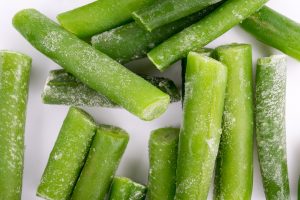 The recent outbreak left many people in a tizzy. Not only did they have to stay home, their budget was cut in half or worse. A lot of people Dublin, CA, and around the world wanted to cut their budget, while stocking up and ensuring they had plenty of food in the house, just in case. I got a lot of questions on whether frozen food was actually healthy. There’s good news and bad news. If you’re talking about poppers, fried chicken TV dinners and pizza rolls, the answer is absolutely NO. They’re the epitome of processed food. However, as far as frozen fruit and vegetables, they may be even healthier than the fresh type at the store.
The recent outbreak left many people in a tizzy. Not only did they have to stay home, their budget was cut in half or worse. A lot of people Dublin, CA, and around the world wanted to cut their budget, while stocking up and ensuring they had plenty of food in the house, just in case. I got a lot of questions on whether frozen food was actually healthy. There’s good news and bad news. If you’re talking about poppers, fried chicken TV dinners and pizza rolls, the answer is absolutely NO. They’re the epitome of processed food. However, as far as frozen fruit and vegetables, they may be even healthier than the fresh type at the store.
Frozen foods are packed fresh off the vine.
The fruits and vegetables are field fresh, something you wouldn’t have unless you grew it yourself. That’s important when you consider that as each day passes, whether it’s on the way to the store or as it sits on the grocery shelf, the fruit or vegetable loses vitamins and other nutrients. Most fresh fruit or vegetables have been picked before they were ripe, to stay fresh for the long travel to market, unless they were locally grown.
Frozen foods have less contact with people.
That’s right. Many frozen fruit and vegetables are processed close to point of origin. They’re washed and processed by machines. Some food is also blanched, when necessary, then immediately packaged, without being touched by human hands. Unlike fresh produce that has been inspected and touched by a hundred hands before you reached them or how many people sneezed or coughed near them. That’s something to consider, particularly after recent events. Don’t forget to always thoroughly wash fresh produce when you get home.
You’ll save money by freezing food and adding them to a healthy diet.
Frozen fruits or vegetables are often less expensive than their fresh counterparts. You can take out what you need from a package and either reseal it or put the balance in a freezer bag. That makes less waste when you’re cooking for one or two. If fresh fruits and vegetables are in season or food is on sale, you can freeze it to extend its life, while saving money and boosting the nutritional value of meals.
- You can buy lean meat, poultry and fish in bulk and repackage to individual servings or family size servings. It saves money and can keep you on the track toward better health.
- Freezing helps slow any potential bacterial growth, but it doesn’t stop it. If you’re freezing food at home, make sure you wash your hands and surfaces thoroughly and pack in a clean container.
- If you need to thaw frozen food before cooking, like lean meat or fish, help prevent the growth of any potential bacteria by defrosting them in the refrigerator, not in the sink or on the counter.
- If you’re trying to lose weight, plan your meals. Cook double portions over the weekend and freeze. You’ll have nutritious meals for the week and some left over for later weeks.
For more information, contact us today at LIV Fitness
